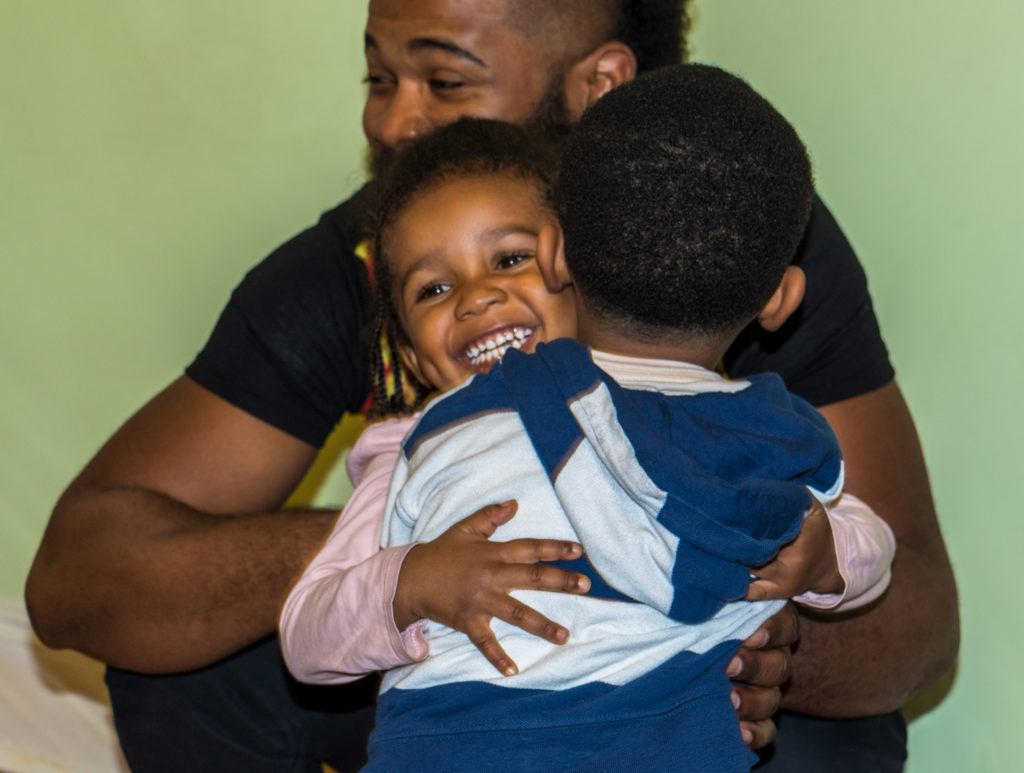(Newly-found speech from 1999!)
When people ask me: what exactly is the P.E.T. method of parenting, I usually feel somewhat dissatisfied with my answers. I suspect many of our P.E.T. Instructors have felt the same way.
So, when I sat down to prepare for this speech, I decided I would use the opportunity to see if I could develop a better and more comprehensive answer to the question: What is the P.E.T. method of parenting?
I am reminded of the story about the four blind men who wanted to learn what an elephant was like. One felt the elephant’s tail and announced that an elephant is like a snake. The second one felt one of the animal’s legs and he announced that an elephant is like a tree. The third felt only the elephant’s trunk and concluded elephants are similar to a huge rope. The fourth blind man touched one of the tusks and he compared the elephant to a spear.
This story obviously illustrates how people see things from a different perspective. For example, many clergymen have taken P.E.T. Some have even become trained as authorized instructors. I’ve heard what they say about the P.E.T. parenting method:
- “P.E.T. is a direct application of the Golden Rule to raising children — Do unto others as you would have them do unto you.”
- “P.E.T. skills are congruent with the Christian faith … they become even more effective as they are powered by God’s love in Christ.”

Thousands of educators have also taken P.E.T. — teachers, counselors, administrators. They have had their own unique ways of describing P.E.T.:
- “P.E.T. parenting produces kids who are better students.”
- “P.E.T. produces kids who are not disciplinary problems at school.”
- “P.E.T. parenting provides a home environment that fosters mental and intellectual stimulation as well as creativity.”
There also is much truth to educators’ opinions of P.E.T. A research study evaluated three groups of children: those with autocratic parents, those with permissive parents, and those with democratic parents. All the children were given IQ tests every year until they had finished high school. The researchers found that the IQ’s of the democratically raised children increased significantly over the years, the average increase being eight IQ points. The IQ’s of the children with autocratic parents decreased slightly, and the IQ’s of the children with permissive parents stayed the same. The researchers concluded: “It would appear that the democratic environment is the most conducive to mental development.”
Let’s look at the unique ways a professional psychologist might describe the P.E.T. method of parenting:
- “P.E.T. parenting produces kids with high self-esteem.”
- “P.E.T. method of parenting produces youngsters with more self-confidence and more self-discipline.”
- “P.E.T. parenting makes a democratic family.”
- “The P.E.T. system produces youngsters with better emotional and psychological health.”
Abraham Maslow, A U.S. psychologist and one of the principal founders of “humanistic psychology,” writes these words in his book Motivation and Personality:
“Let people realize clearly that every time they threaten someone or humiliate or hurt unnecessarily or dominate or reject another human being, they become forces for the creation of psychopathology, even if these be small forces. Let them recognize that every person who is kind, helpful, decent, psychologically democratic, affectionate, and warm is a psychotherapeutic force, even though a small one.”
Let’s look at one more profession. How might a sociologist with special focus on studying society and culture describe the P.E.T. method of parenting?
- “P.E.T. parenting produces youngsters who are less likely to engage in anti-social, delinquent, high-risk behaviors.”
- “P.E.T. parenting produces kids who will become better citizens in a democracy.”
- “P.E.T. parenting helps kids to be more self-disciplined.”
P.E.T. parenting is strongly opposed to discipline, to punishment – making kids obey their parents.
Let me summarize the results of a number of different research studies contrasting kids from families that use punishment and families that do not.
- Non-authoritarian, non-punitive, more democratic families have children who are healthier in a number of ways: less vandalism, less violence against other youngsters, less delinquency, less aggressive behavior, fewer arrests, and higher “social responsibility.”
- According to psychologists Maccoby and Martin, children of authoritarian parents show less evidence of “conscience.” Their source of control is outside not inside — they have low self-control, self-discipline.
Now, as the creator of the P.E.T. method of parenting, I should be allowed to give my own very personal answer to the question: What is the P.E.T. method of parenting? I’m sure I’ll be strongly influenced by my unique experiences, like everyone else.
When I think about P.E.T., one word comes to mind. A word that is the exact opposite of control. That word is freedom. Freedom is what the P.E.T. parenting method is all about.
Now there are several different prepositions that can be attached to the word freedom: freedom of, freedom from, freedom to.

First, let’s consider “freedom of.” The P.E.T. method of parenting first of all gives youngsters freedom of speech:
- P.E.T. was the first parent training program to teach parents a new and effective way of responding to what their children tell them. We call it “Active Listening.” It should be called “Magical Listening,” because it is so amazingly effective in getting children to feel free to express themselves — showing children that it’s acceptable to say what they mean, acceptable to get their feelings off their chests, acceptable to share their problems. And what is even more magical about Active Listening, it keeps ownership of the problem with the child and helps him/her start problem-solving.
- We also urge parents to avoid what P.E.T. calls the Roadblocks to freedom of speech — messages that inhibit children from talking — giving commands, threats, judgments, criticisms, name-calling. We call such messages “verbal abuse.”
So, no wonder we have observed in P.E.T. families that their children are spontaneous, they share their ideas and their feelings, they bring their problems out in the open. These families truly have two-way communication — open, honest and direct. The opposite of “children should be seen and not heard.”
Next, let’s consider “freedom from.” The P.E.T. parenting method insures children freedom from the fear the punishment, freedom from both physical abuse and verbal abuse, freedom from pressure to obey rules unilaterally laid down by parents, freedom from the control of people bigger and stronger than they, freedom from the shame and embarrassment of ridicule, derision, name-calling or put-downs. P.E.T. mothers and fathers talk to their children very much the same way the parents talk to each other. And P.E.T. creates families without bosses, without second-class citizens.
P.E.T. was the first parent training program to teach parents specific skills and step-by-step procedures for creating such a family of equals.
- Involving children in setting rules with parents.
- Our 6-step conflict-resolution method that produces solutions acceptable to all family members — nobody loses.
Governing a family democratically (participative management) produce benefits that are truly striking:
- Love and closeness replace fear and alienation in the parent-child relationship.
- Parents say our children are our best friends, and children say my parents are my best friends.
- We solve our conflicts peacefully.
- “In our family, everyone’s views are equally important.”
Finally, the P.E.T. parenting method gives children “freedom to.” Freedom to get their basic needs satisfied. If our P.E.T. course should by chance be limited to teaching only one thing, I feel it should be the principle that human beings (exactly the same as plants, animals, and all living things) are healthier, stronger, more effective, more resistive to harm, and more apt to live longer when their basic needs are met. And the reverse of that principle: those in society who have the misfortune of having a lot of their needs deprived are the ones who feel unhappy, angry, frustrated, revengeful, violent. They’re the ones who commit acts that are destructive to self or to others. Like a plant that is allowed to be undernourished, these people become sick.

The P.E.T. parenting method, however, is firmly based on the principle of mutual need-satisfaction in the parent-child relationship. Both parents and children must get their needs met. The relationship has to be reciprocal, equitable, fair. Parents must not be permissive, must not ignore their rights. They must not be autocratic and ignore the needs of the child.
Consider these sentences in the P.E.T. Credo for My Relationships with My Child:
- “Each of us is a special person with unique needs and the right to meet those needs….”
- “When you are having problems meeting your needs, I will listen and help you find solutions…. I hope you will do the same for me.”
- “I respect your needs, but I also must respect my own….”
- “So, if we have conflicts let’s always try to find solutions that will be acceptable to both of us. Your needs will be met and so will mine — neither will lose, both will win…”
Finally, the P.E.T. parenting method gives children another precious freedom — the freedom to develop their own talents, beliefs and values, different though they might be from their parents.
With this kind of freedom, children in P.E.T. homes have the freedom to be different from their parents, to find their own unique road down which to travel. P.E.T. helps parents accept that it is inevitable that human values change, that “life goes not backward nor tarries with yesterday,” that the beliefs and values of one generation may not be the ones of the next. The P.E.T. parenting method gives children the freedom to become what they are capable of being and it shows parents how to help their children be their best.

